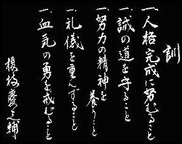Role of Instructor
Extracts from the Foreword to the “Coach’s Manual” by Hidetaka Nishiyama
“The role of the coach is critical to development and progress in any sport including Traditional Karate. It is through the coach that quality standards in the sport are set. Expertise in executing techniques must be balanced with an ability to communicate with students on all aspects of the martial art. A good naturaI athlete may excel, but low quality instruction will hold him back from
achieving his full potential. The quality achieved in the sport is directly proportional to the quality
of coaching instruction. Traditional Karate has a goal of “unlimited seeking” or striving for improvement. The sensitivity and judgment required of the coach in this sport therefore is of particular significance. The responsibility of the coach includes directing progress at all levels – technical, physical and spiritual. Incorrect teaching methods, errors in understanding and disreputable or unqualified Traditional Karate instructors can cause great harm to an individual’s progress at all levels – technical, physical and spiritual.”
Hidetaka Nishiyama
Dojo Kun
Gichin Funakoshi’s Dojo Kun (Code of Practice)
Hitotsu. Jinkaku Kansei ni Tsutomuro Koto.
Hitotsu. Makoto no Michi wo Mamoru Koto.
Hitotsu. Doryoku no Seishin o Yashinau Koto.
Hitotsu. Reigi o Omonzuru Koto.
Hitotsu. Kekki no Yu o Imashimuru Koto. (Japanese)
The Dojo Kun, or dojo rules, serves as a set of five guiding principles, recited at the begining of each Shotokan training session, intended to frame the practise within an ethical context.
Seek Perfection of Character
Defend the Path of Truth
Endeavor to Excel
Display Courtesy
Refrain from Violent Behavior
Gichin Funakoshi
Aproved by Muswell Hill Karate Academy
